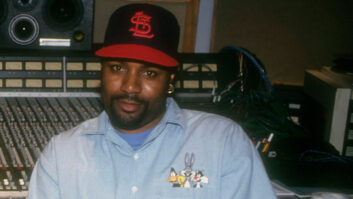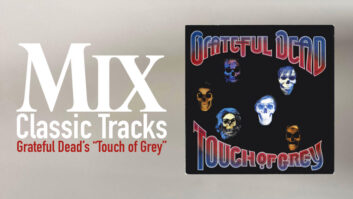
Los Angeles, CA (January 20, 2021)—Producer and convicted murderer Phil Spector died in a prison hospital January 16, 2021. In his music-making prime during the early to mid-1960s, Spector created hit after hit with a rotating series of singers and session musicians, developing the Wall of Sound production method that became his trademark. While his obsessive nature aided his quest to turn simple pop songs into aural epics that exploded out of the mono transistor radios of the era, that same quality also led to severe mental illness, wrathful control issues and erratic, violent behavior that that came to a head with his 2003 murder of actress Lana Clarkson. Sentenced in 2009 to 19 years-to-life in prison, Spector contracted COVID-19 in December, 2020 and died due to complications from the virus. He was 81.
Phil Spector was born in the Bronx borough of New York City the day after Christmas in 1939; his family moved to Los Angeles when he was 14, following the suicide of his father. Forming a group, The Teddy Bears, with high school friends, Spector had his first success penning and co-performing the group’s sole hit, “To Know Him is to Love Him,” in 1958. After they broke up the following year, Spector headed back to New York City, where he became a musical jack-of-all-trades, co-writing Ben E. King’s hit, “Spanish Harlem,” and playing guitar on The Drifters’ “On Broadway.” Returning to L.A., Spector moved into record production and soon began cranking out a seemingly endless stream of hits with acts like The Crystals (“He’s A Rebel”), Darlene Love, The Ronettes (“Be My Baby”), The Righteous Brothers (“You’ve Lost That Lovin’ Feelin'”), Ike & Tina Turner (“River Deep – Mountain High”) and more.
During this era, Spector developed his trademark “Wall of Sound” production method, often working at Gold Star Studios in Hollywood with engineer Larry Levine, arranger Jack Nitzsche and a loose-knit group of first-call session musicians nicknamed The Wrecking Crew. The dense, bombastic sound was based around a near orchestral approach—rather than use the typically sparse instrumentation of the day, a Phil Spector production would have dozens of musicians crammed into one room, with multiple instruments playing the same parts in unison to create larger, thicker tones, whether that was the same instrument—say, three guitars—or different, though related ones, such as a piano, organ and harpsichord. The thick, sometimes gummy sound was further expanded through use of echo, reverb and distortion; this, along with the fact that they were recorded live in the studio rather than multitracked piecemeal like they would be today, gave the performances an immediacy and often overpowering drive that set them apart from anything else on the charts at that time.
Spector went into semi-retirement in 1966, and married Veronica Bennett, better known as Ronnie Spector of The Ronettes in 1968, adopting a son and later surprising her by adopting twins as a Christmas present. It was, by all accounts, a cruel, abusive marriage that found Bennett and the children kept captive in Spector’s mansion, though Bennett ultimately made a late-night escape from their mansion—and marriage—in 1972. In their 1974 divorce settlement, she gave up all claim to future royalties on the Ronettes’ work and likewise gave up custody of their children—a decision she said was made because Spector threatened to have her assassinated. In the decades since, two of the children have alleged they endured sexual abuse due to Spector in the years after Bennett left.
UK Producer Steve Brown, Dead at 65
Pro Audio In Memoriam 2020
By this time, Spector had revived his production career, as he was hired in 1970 to assemble rough takes recorded by the Beatles into the band’s final album, 1970’s Let It Be. While it was a massive hit, Paul McCartney took issue with Spector’s heavy-handed embellishments, eventually going so far as to have the album remixed without them and released as 2003’s Let It Be…Naked. Nonetheless, Spector made inroads with the other Beatles as a result of the collection and went on to record multi-platinum albums for John Lennon (Imagine; Some Time in New York City) and George Harrison (All Things Must Pass; The Concert for Bangladesh). With Spector’s increasing unpredictability, however, both artists eventually stopped working with him. Lennon initially hired the producer for what would become 1975’s Rock ‘n’ Roll, but Spector’s heavy alcohol abuse and wild behavior like showing up to record in surgical scrubs, firing a gun into the studio ceiling, spilling whiskey into A&M Studio’s console, and ultimately kidnapping the session tapes for months at a time, led the project to be shelved for a number of years.
Spector closed out the 1970s recording poorly received albums with the Ramones and Leonard Cohen, and remained largely inactive throughout the next 20 years, sporadically working with on tracks with Yoko Ono, Starsailor and a failed collaboration with Celine Dion (Dion allegedly walked, fed up with Spector’s dithering). Spector spent much of those years in reclusion, fading from public memory, but that ended abruptly on February 3, 2003, when he shot actress Lana Clarkson in the mouth at his mansion. Barely acquaintances, Spector had invited her to his home after they met at L.A.’s House of Blues, and later claimed the death was an “accidental suicide.” Spector’s driver called 911 and quoted him in the call as saying “I think I’ve killed somebody.” After a 2007 trial ended in a hung jury, a second trial resulted in Spector’s March, 2009 conviction.
While Spector’s musical ingenuity is still admired in many quarters, his volatile actions throughout his career have long since overshadowed whatever accomplishments he achieved. He will not be missed.







